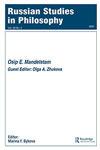海德格尔的存在本体论及其在苏联和后苏联时期的重建
IF 0.1
4区 哲学
Q4 Arts and Humanities
引用次数: 0
摘要
海德格尔是西方哲学史上最具原创性、最重要的思想家之一,但他的哲学工程却难以把握和欣赏。他认为,自亚里士多德时代以来,存在的问题一直被忽视,他把本体论的基本意义提了出来。然而,他仍然对传统的本体论研究持批评态度。他特别反对笛卡尔的本体论,即用存在来回答存在问题的“物性”本体论,这种本体论掩盖了存在的真理。海德格尔论证了虽然本体论问题在哲学史上发挥了一定的作用,但以往的哲学都是关注存在或事物的存在。然而,存在不是一件东西,而是“超越”事物的东西,“超越纯粹而简单的东西”。这种“超越”只能通过“在世界中存在”的真实经验来打开,海德格尔将此定义为对在此的分析,并将其理解为人类存在的时间和历史特征。海德格尔对哲学的独特贡献始于他将人的存在经验情境与本体论立场本身等同起来。他说:“此在是本体论的,所以它在本体论上是有区别的。”他指出,经验存在的条件恰恰是使实体的存在在思想和言语中显化或可理解的条件(λ本文章由计算机程序翻译,如有差异,请以英文原文为准。
Heidegger’s Existential Ontology and Its Reconstruction in Soviet and Post-Soviet Russia
Heidegger is one of the most original and important thinkers in the history of Western philosophy, but his philosophical project is difficult to grasp and appreciate. Formulating his quest as the revival of the question of Being that he believes has been ignored since the time of Aristotle, he brings to the fore the fundamental significance of ontology. Yet he remains critical of traditional ontological inquiry. In particular, he opposes Cartesian ontology, i.e., ontology of “thingness” that answers the question of Being in terms of beings, and in doing so conceals the truth of Being. Heidegger demonstrates that while ontological issues played a certain role in the history of philosophy, all previous philosophy was concerned with beings or things in their being. However, Being is not a thing, but that which “transcends” things, “the transcendens pure and simple.” This “transcendens” could be open only through the authentic experience of “Being-in -the world” that Heidegger frames as the analytic of Dasein understood as human existence in respect to its temporal and historical character. Heidegger’s unique contribution to philosophy begins with his identification of the human being’s existential-experiential situation with the ontological position itself. Saying that “Dasein is ontically distinctive in that it is ontological,” he points out that the condition of experiencing-existing is precisely that of rendering the Being (ὄν) of entities explicit or intelligible in thought and speech (λόγος), and is thus most basically the condition of a being concerned with Being. Thus, the question of onto-logy, literally the meaning of Being, is implicated in the very Being of the being who inquires after it. According to Heidegger, the prevailing Western consensus on ontology rests on the Cartesian cogito ergo sum. However central to philosophy as a whole, the question of what it means to “be” was never quite considered. Heidegger criticizes thinkers who regard humans as detached from the world around them, mere observers of objects from which they are independent. Instead, he
求助全文
通过发布文献求助,成功后即可免费获取论文全文。
去求助
来源期刊

RUSSIAN STUDIES IN PHILOSOPHY
PHILOSOPHY-
CiteScore
0.10
自引率
0.00%
发文量
14
期刊介绍:
Russian Studies in Philosophy publishes thematic issues featuring selected scholarly papers from conferences and joint research projects as well as from the leading Russian-language journals in philosophy. Thematic coverage ranges over significant theoretical topics as well as topics in the history of philosophy, both European and Russian, including issues focused on institutions, schools, and figures such as Bakhtin, Fedorov, Leontev, Losev, Rozanov, Solovev, and Zinovev.
 求助内容:
求助内容: 应助结果提醒方式:
应助结果提醒方式:


